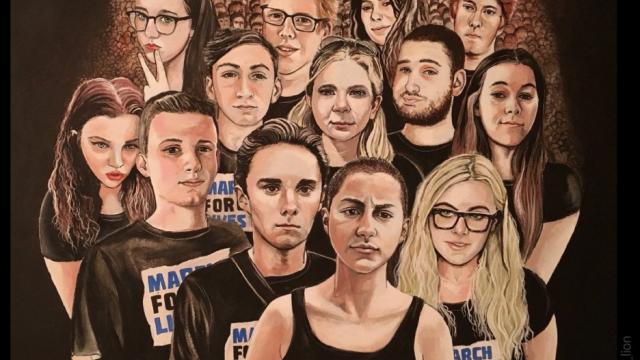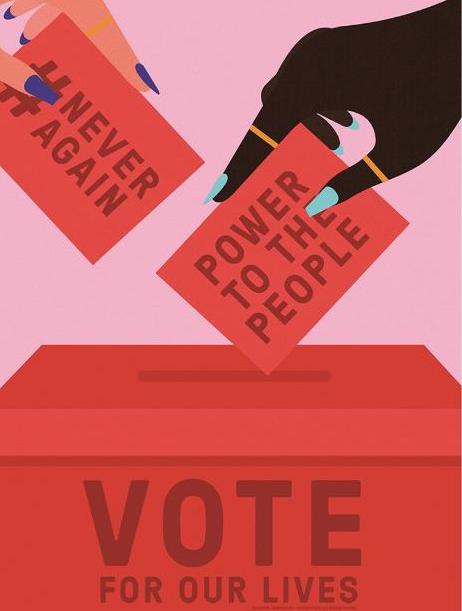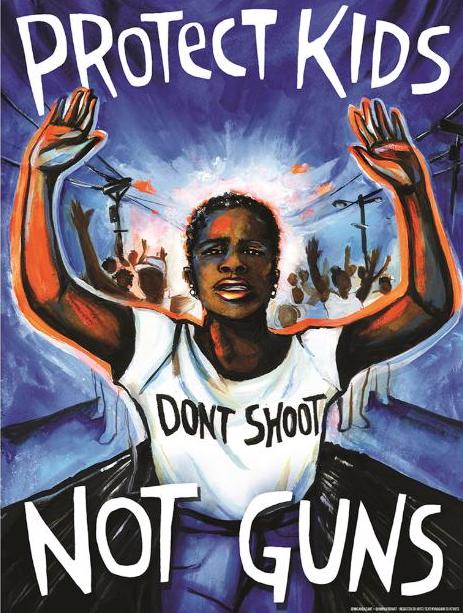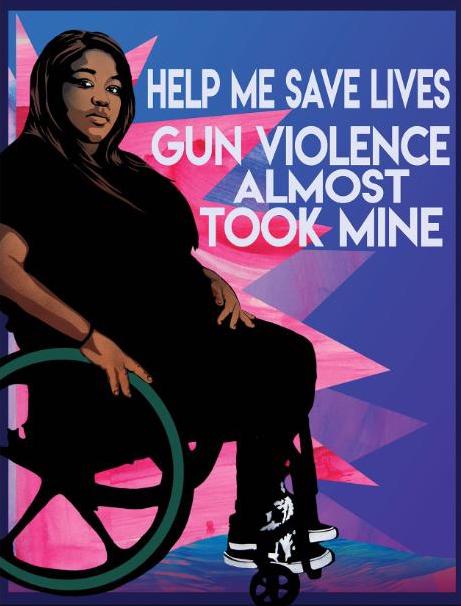
Thousands of people are expected to rally in Washington, DC, this weekend for a March for Our Lives protest to advocate for gun control. Thousands more will join them at other marches in cities large and small across the country.
Their motto is #NeverAgain.
This march, happening Saturday, March 24, at noon Eastern time in DC, marks the second big push of teenage activism against gun violence in the wake of the mass shooting at Marjory Stoneman Douglas High School in Parkland, Florida. Close to a million students stood up and streamed out of classrooms across the country last week as part of the National School Walkout. The protest honored the victims of the Parkland shooting one month ago and called on lawmakers to pass gun control legislation.
Another national school walkout is planned for April 20, the anniversary of the Columbine shooting.
The survivors of the Parkland shooting spearheaded the March for Our Lives. Coming on the heels of the walkout on March 14, it is another early sign that this renewed push for gun reform is gathering strength.
Haley Zink, a 21-year-old community college student who’s helping to organize a “sibling march” in St. Louis, has a message for those who think this march and movement is just a bunch of loud kids: “I want to it be clear to everyone that, no we are not.”
They have a plan, she said. “Just because of our age, that doesn’t mean we can’t be structured and be smart about our actions because this is about our future,” she said. “This is the world we grew up in, and this is the world we have sitting out in front of us. Most of us have never gone to school in a place where gun violence was not normalized, and that is not okay. And so we have to take it in our hands to fix it.”
Lane Murdock, a sophomore at Ridgefield High School in Connecticut who started a petition for the idea of an April 20 walkout, told Vox these protests are more than symbolic. They’re the first step in a real grassroots movement for concrete changes to gun laws.
“There is a lot more to come,” Murdock said. “It’s big enough that it scares me. It’s going to be hard — but it’s realistic enough that I know we can get it done.”
What to Expect From the March For Our Lives
Teenage activists are preparing for two more major activist events in the coming weeks: March for Our Lives on Saturday, March 24, and a National School Walkout on April 20.
Survivors of the school shooting in Parkland organized the March for Our Lives in DC, on March 24 with the support of Everytown for Gun Safety, a gun reform group.
“A march to get the entire country to unite under one cause — it is the ultimate show of prominence and support and just rage toward the things that have been happening in our country for so long,” Delaney Tarr, a 17-year-old senior at Stoneman Douglas, told Vox last month.
In Washington on March 24, protesters will rally along Pennsylvania Avenue starting at noon. The demonstration could draw as many as 500,000 people to the nation’s capital. The rally will include speeches and performances, including from Ariana Grande and Demi Lovato.
More than 800 “sibling marches” are also planned worldwide, from Maui to Lincoln, Nebraska, to Portsmouth, New Hampshire, to Hong Kong.
Brock Pate, an 18-year-old high school senior, is organizing a sibling march in Hickory, North Carolina, about an hour outside Charlotte. It will be small by DC standards — 135 have said they’d attend, about 300 interested. “We’re motivated out of fear. Like many other March for Our Lives protest statements, we’re fed up with inaction,” Pate said.
“This does not end after March 24, or even after April 20,” he said.
Expect Another Big Walkout on April 20
A month after the march, students will walk out of classrooms against on April 20, the 19th anniversary of the Columbine school shooting in Colorado. Murdock came up with the idea immediately after the Parkland shooting; she was tired of how numb America was becoming to yet another school shooting. “But I also just felt really powerless,” she told Vox. So, she thought, “what could I do to help other kids who felt really powerless?”
On the day of the Parkland shooting, Valentine’s Day, she said, she created a petition: a rough outline of what she wanted to see happen, which was for kids to pledge to walk out. “It kind of blew up overnight,” she said.
Indivisible, a progressive organizing group founded after the 2016 election, is backing the April 20 walkout and helping Murdock and some of her fellow students organize.
Some students who participated in the March 14 walkout told Vox they would also demonstrate on April 20, though not all had events planned. Students at more than 1,500 schools have signed up so far, though that number will probably balloon as the date gets closer.
“April 20 isn’t the end of this,” Murdock said. “April 20 is the launch. We want to make sure we take all this momentum, power, and interest and turn it into concrete, actual change.”
Teen Activism is Driving a New Push for Gun Control
The Parkland survivors ignited a new gun reform movement by finding a platform in their tragedy. David Hogg rode his bike to school after the shooting to film as a journalist and then found himself on Fox News, where he said there couldn’t be another mass shooting. Emma Gonzalez’s speech led to a chant: “We call BS.” Cameron Kasky challenged Florida Sen. Marco Rubio on accepting donations from the National Rifle Association during a CNN town hall.
Student activists are tired of being numb to school shootings, of simply moving on, of referring to “another” school shooting. Some have watched guns steal away family, friends, and classmates.
Kari Gottfried, a junior at Corvallis High School in Oregon, is 17; she wasn’t even born when the shooting at Columbine High School happened. “I’ve never known a world where there aren’t mass shootings,” she said.
Gottfried and her fellow student activists feel this issue personally. They were in middle school when the Sandy Hook Elementary School shooting happened — old enough to understand the savagery, young enough to remember their own elementary school classrooms. They’ve grown up with active shooter drills, watched protocol morph in response to the latest tragedy. Gottfried said that now if the fire alarm goes off, students are told to go into lockdown mode. “It’s more likely there would be a shooter than a fire in Corvallis,” she said.
“We’re no strangers to gun violence,” Fiorina Talaba, an 18-year-old senior from Carson High in California, said of herself and her fellow students. “When we heard about the shooting in Florida, it really spoke to us, and we wanted to have some type of change.”
The teenage activists have another thing in common: social media. Students across the country are connecting with each other, sharing strategies and stories. Maxwell Nardi, an 18-year-old senior at Douglas S. Freeman High School in Richmond, Virginia, made the case that those who demeaned his generation for being obsessed with their phones are in for their own awakening. “We’re fighting for this issue, we’re making our voices these tools,” he said.
Arielle Geismar, a 16-year-old junior at the Beacon School in Manhattan, is organizing a bus to DC for the March for Our Lives. She said she felt an “urgency of collaboration.”
“Our generation is so easily discredited as the social media generation, always on our phones,” she said. “But look what social media has done for this movement. It turned into this national thing.”
The public pressure has pushed lawmakers to act Students pushed for gun law reform with the National School Walkout. They’re focusing on small actions — what teenagers can do to get more involved, including registering to vote and writing to lawmakers.
But they can already claim some victories. The big one: refusing to let the country move on and forget.
That has put pressure on lawmakers to act. Staunchly pro-gun Florida bucked the NRA to pass the first gun restrictions in the state in 22 years, in consultation with the families of Parkland victims. The law increased the age to purchase a firearm to 21, instituted a three-day waiting period, and created a system for police to petition to remove guns from someone deemed a threat. It put millions of dollars toward school safety and mental health initiatives, though it included a controversial, voluntary program to arm some school employees.
Dozens of other states passed new gun safety measured in the aftermath of Parkland or are mulling new restrictions. Kansas, New York, and some other states are considering legislation similar to Florida’s that would allow for judges to temporarily remove guns if people are deemed a threat. These “red flag laws” existed in five states before the Parkland shooting. Rhode Island’s governor signed an executive order to institute such a policy after Parkland.
Washington state banned bump stocks, devices that effectively let semiautomatic weapons function like fully automatic ones. Cincinnati, Ohio, wants to do the same. Illinois is trying to pass a measure that would require criminal background checks for all gun shop employees; the Parkland shooting has reanimated debate over the legislation.
And some states have backed away from loosening gun control laws. Iowa is letting a bill die that would have removed the permit requirement to carry weapons.
The Trump administration took steps to ban bump stocks in the wake of Parkland and just released a school safety plan. It calls for “risk protection orders” to confiscate weapons from those deemed a threat and has a proposal to arm teachers.
It also calls on Congress to pass the Fix NICS Act, a bipartisan bill introduced after the Sutherland Springs, Texas, shooting to strengthen the background check system. The White House’s plan is largely NRA-friendly — but the White House did not take similar action in the wake of massacres in Las Vegas or Sutherland Springs.
Students activists said they’re open to different ideas and debates about the Second Amendment. Geismar said she and her fellow activists are just looking for middle ground. “It’s not Republican or Democrat; it’s about keeping people safe,” she said.
Talaba said she and her fellow students were focused particularly on mental health. She believes tighter background checks will help. But she also sees that as a first incremental, achievable step.
The walkout was a chance to stake out their role in this debate. “I just don’t like how congressmen, or these older people, just don’t see that even us kids, we can have these very serious conversations,” Talaba said. “We know what we want from our society: to have less guns and, at some point, no guns at all.”
These demonstrations are also a reminder for lawmakers to listen and take these student activists seriously. All they can do now is lobby for change. But soon they’ll be the ones with the power to decide politicians’ fates — if not in 2018, then in 2020.
But it’s bigger than elections, and uncomfortable conversations. As Nardi, the senior from Richmond said, “This is literally matter of life and death.”
3 WAYS TO SHOW YOUR SUPPORT
- Log in to post comments














